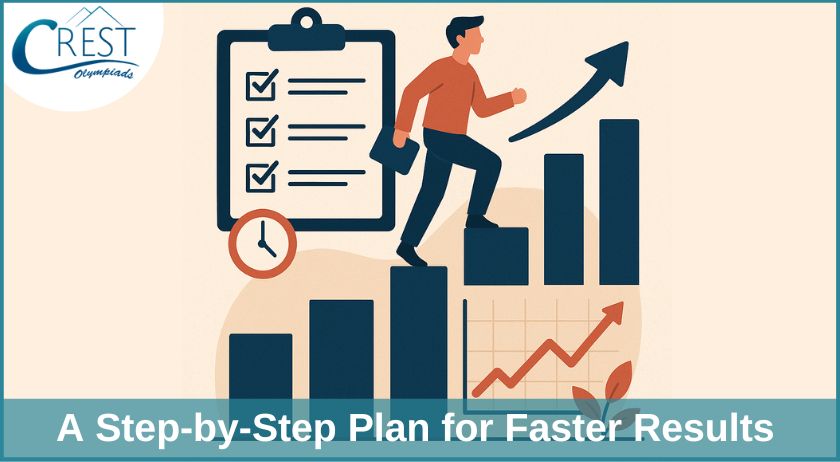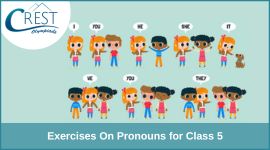How to Prepare for Olympiads: A Step-by-Step Plan for Faster Results
First things first: Olympiad exams reward THINKING, not MEMORY! This fundamental difference should make all the difference in the preparation.
Success in Olympiads requires developing analytical skills through strategic practice. And it all begins with building a strong foundation by using the right preparation methods. That's exactly why you're here, and this Olympiad Preparation Guide addresses everything you need.
However, beyond the basic "how to prepare for Olympiad" question, you likely have several other concerns:
Which preparation books work best?
What does the complete syllabus cover?
How do I create effective study plans?
What's the ideal study schedule?
This Olympiad preparation strategy is developed through analysis of 500+ successful student journeys and insights from experienced educators. Our survey of 1,000 Indian parents provides real-world validation for this guide.
Table of Content
- Why Olympiad Preparation Matters for Students
- 7 Proven Olympiad Preparation Tips
- Smart Study Plan: Weekly & Monthly Structure
- Best Resources and Books for Preparation
- Pre-Exam Nutrition Strategy
- Parents' Action Checklist
- Survey Insights: What 1,000+ Parents Told Us
- Self-Study vs. Coaching Classes
- Frequently Asked Questions
Why is Preparation Essential For Students?
Ever wondered why some children excel effortlessly while others struggle? The answer isn't natural talent, it's exposure to the right intellectual challenges at the right time.
But the problem is that the majority of parents do not know where to start and how to support their child in the best possible way. The truth lies in the following formula:
Conceptual Clarity + Consistent Practice + Smart Parental Guidance = Olympiad Preparation
Key Benefits of Olympiad Preparation
- 72% reported significant improvement in their child's overall school performance
- 85% noticed enhanced problem-solving abilities beyond exam contexts
- 68% observed increased confidence in tackling challenging subjects
- 79% saw better time management skills developing naturally
7 Quick Olympiad Preparation Tips That Actually Work
These strategies are developed through analyzing successful student journeys and validated by experienced educators nationwide.
- Build a Rock-Solid Foundation First
Start with school textbooks to get rock-solid basics before moving to Olympiad-level material. Students need to know the basics well and not learn formulas, as questions in Olympiad exams are based on application and reasoning, not on recall.
Action Step: Dedicate the first 2-3 weeks to reviewing school textbooks chapter-by-chapter, ensuring 90%+ accuracy on basic exercises.
- Create a Strategic Topic-Wise Study Schedule
Once you know the complete Olympiad syllabus, plan your weeks strategically for certain subjects, such as algebra or geometry. This focused approach enables better understanding and avoids superficial coverage of many topics at once - a very common mistake that leads to confusion during exams.
Action Step: Map out 12 weeks covering 12 major topics, spending 5-6 days per topic with weekly assessments.
- Use Mock Tests as Your Performance Compass
Regular mock tests help to identify weak areas and track improvement over time. These practice sessions mimic real exam conditions, which helps to build confidence while highlighting areas that need further attention.
Action Step: Schedule mock tests every Sunday, treating them exactly like the actual exam (timed, no interruptions, proper answer sheet).
- Develop Non-Negotiable Daily Study Habits
Spend 30 minutes a day on solving free downloadable worksheets to make the base stronger for the Olympiad exams. This habit is the backbone of Olympiad success and enhances performance for all academic subjects.
Action Step: Set a fixed daily time slot (preferably morning) and treat it as non-negotiable study time.
- Transform Every Mistake into Learning Opportunities
After each practice session, analyze wrong answers in depth. Understanding why an answer is wrong helps prevent such mistakes and reinforces correct approaches to solving problems - every mistake becomes a stepping stone to mastery.
Action Step: Maintain an "error journal" documenting mistakes, correct solutions, and concepts to review.
- Prioritize Deep Conceptual Understanding
Even 1-2 hours of focused daily practice with conceptual study is better than intensive cramming sessions. Hence, students can use free reading material for learning the concepts better, decrease last-minute stress, and build the mental discipline necessary for success in competition.
Action Step: Use the Feynman Technique—explain each concept in simple language as if teaching someone else.
- Master Previous Year Papers Strategically
Solving past papers reveals question patterns, difficulty levels, and time management requirements. This practice demystifies the exam format and builds strategic awareness.
Action Step: Download the last 3 years' papers, solve them under timed conditions, and analyze scoring patterns.
Best Resources and Books for Olympiad Preparation
CREST Olympiad Books provide curriculum-aligned content with proper difficulty progression. These books contain topic-wise questions matching actual exam patterns, eliminating guesswork about study priorities.
Subject-Specific Recommendations
- Mathematics: CREST Mathematics Olympiad books (Class-wise editions)
- Science: CREST Science Olympiad books with experiment-based questions
- English: CREST English Olympiad books focusing on comprehension and vocabulary
- Reasoning: Dedicated logical reasoning workbooks with pattern recognition
Free Resources with Maximum Impact
Access unlimited practice opportunities without a financial burden
- Previous Year Papers: Understand actual question formats and difficulty levels
- Sample Papers: Practice with exam-pattern questions before attempting mocks
- Downloadable Worksheets: Build daily practice habits with topic-specific exercises
- Video Explanations: Visual learning for complex concepts (available on the CREST platform)
Smart Investment Strategy
Start with free resources to understand exam patterns and difficulty levels. Once familiar with the format, consider investing in premium practice papers for additional structured support and detailed performance analytics.
Building Confidence with Trial Classes
Free trial registration allows students to experience the actual exam interface and question types. This exposure dramatically reduces exam-day anxiety and improves performance confidence through familiarity.
[Register for Free Trial Class →]
Pre-Exam Nutrition Strategy for Peak Performance
Proper nutrition directly impacts cognitive performance, memory retention, and concentration levels.
Foods to Include Before Exam Day
Complex Carbohydrates (Sustained Energy): Oatmeal, brown rice, and whole-grain bread provide steady energy without crashes.
High-Protein Foods (Concentration): Eggs, nuts, seeds, and lean meats support sharp mental focus.
Antioxidant-Rich Fruits (Memory Enhancement): Blueberries, apples, and strawberries boost memory and cognitive ability.
Leafy Green Vegetables (Alertness): Spinach and broccoli provide essential vitamin K for mental alertness.
Healthy Fats (Brain Function): Almonds, walnuts, and flaxseeds support optimal brain performance.
Foods to Eliminate Before Exam Day
- Sugary drinks and candy: Cause energy spikes followed by crashes, disrupting concentration.
- Fast food and processed items: Reduce mental clarity and energy levels.
- Excessive caffeine: Leads to jitters, headaches, and afternoon fatigue.
- Heavy, oily foods: Cause lethargy and digestive discomfort, the last thing needed during exams.
Complete Parents' Action Checklist
Parents are the quiet builders of Olympiad success. Your job goes beyond helping with schoolwork. You also need to make sure that your child has the best possible learning environment, keep their emotions stable, and encourage good study habits.
This checklist makes it easy for parents to go from overwhelming guesswork to strategic, measurable support that directly affects how well your child is getting ready.
Your Action Checklist That Will Change the Game
- The environment provided for studying should stay as free as possible from distractions.
- Draft a schedule that should include time for study, relaxation, and playwork.
- Give support emotionally because when things go wrong or are hard, without putting any pressure to accomplish goals.
- Celebrate small victories, rather than just looking at the desired results and their ranking.
- Keep your expectations practical and measure the growth from where your child started and what he/she is doing right now.
- Arrange regular check-ins to discuss progress, challenges, and your child's needs without the feeling of being questioned too much.
Survey Insights: What 1,000+ Parents Told Us
Our thorough parent survey uncovered unexpected insights that contest traditional beliefs regarding Olympiad preparation. We asked more than 1,000 parents from various states in India whose kids took part in the CREST Olympiads from 2022 to 2024.
Key Finding 1: Getting ready early gives you 50–60% better results.
Parents always say that kids do much better when they start studying for tests 3 to 4 months in advance instead of cramming at the last minute. Getting ready early helps you really understand the material and makes test day a lot less stressful.
What you should do: Mark your calendar and start getting ready for the test in a structured way at least 12 to 16 weeks before the test date.
Key Finding 2: Too many resources don't help Points
67% of parents spent more than ₹5,000 on several preparation books, but students who used focused free resources along with 1-2 good books did just as well on the real tests.
Real-life lesson: Quality and consistency are more important than how many books you read. As a result, it becomes essential to pick 2–3 great resources for practice.
Key Finding 3: Olympiad Prep Makes Students Do Better in School Overall
72% of Indian parents found that their child's overall school performance got much better after they started preparation for the Olympiad exams. Some core skills that came out were time management, problem-solving skills, and more confidence in learning.
Practical Implication: No shadow of doubt that Olympiad preparation is an investment in overall mental growth, not just passing the test.
Start Your Olympiad Preparation Journey NOW!
Now that you understand how to prepare for Olympiad exams effectively. So, be ready to implement these proven strategies.
Your Next Steps
- Assess current preparation level using a diagnostic test
- Create a systematic study plan using our weekly/monthly templates
- Gather recommended resources, starting with free materials
- Register for a trial class to experience the exam format
- Implement the daily study habit starting tomorrow morning
Frequently Asked Questions
Q1. What is the high time to start preparing for Olympiad exams?
Ans: 3-4 months before exams to see good results, as the timeline enables critical concept development without hastening to cover key underlying issues.
Q2. How many hours per day are children supposed to spend on the Olympiad?
Ans: Most students like an average of 1-2 hours a day. The best quality-oriented practice is invariably better in comparison with lengthy and inattentive study periods, resulting in brain weariness.
Q3. Do you need expensive coaching classes to be successful in the Olympiad?
Ans: Motivated students can study using quality materials through self-study. Coaching assists students who require directed guidance, effective interpersonal communication, and professional development that they must follow.
Q4. What about my child who will not be able to solve Olympiad questions at the beginning?
Ans: Simple questions to simple ones and so forth. Develop confidence by practicing regularly, rather than tackling higher-level problems that can cause discouragement and frustration.








